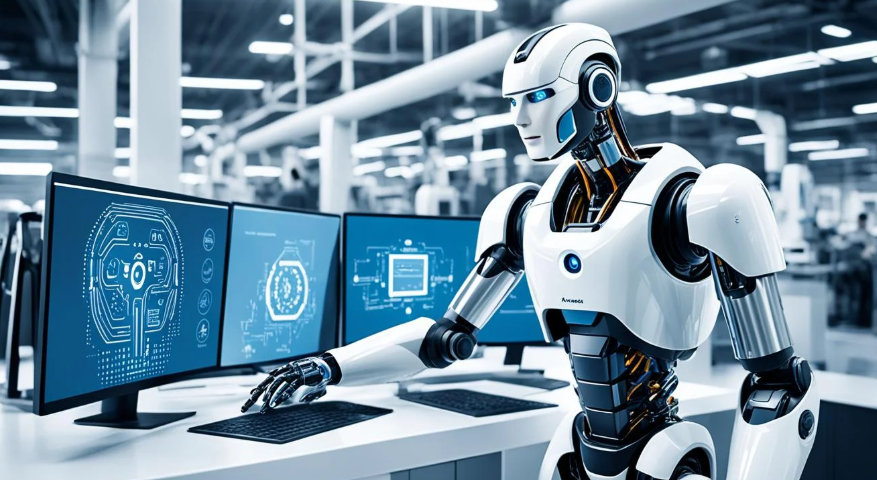The Future of AI: How Artificial Intelligence is Revolutionizing Every Industry
Artificial Intelligence (AI) is no longer a futuristic concept; it is very much present, transforming the way industries operate globally. AI is not only reshaping business operations but is also creating opportunities that were once thought impossible. As AI technology continues to evolve, it is having a profound impact on various sectors, from healthcare to finance, transportation, manufacturing, and beyond. In this article, we will explore the transformative power of AI and its influence across industries.
1. Introduction to Artificial Intelligence
Artificial Intelligence refers to the simulation of human intelligence processes by machines, especially computer systems. This includes learning, reasoning, problem-solving, perception, and language understanding. Over the years, AI has evolved, moving from a theoretical concept to real-world applications that are solving complex problems and providing actionable insights across industries.
AI is divided into two broad categories:
- Narrow AI (Weak AI): These systems are designed to perform specific tasks like image recognition or language translation.
- General AI (Strong AI): This type of AI can understand, learn, and apply knowledge in a way that is similar to human cognitive abilities, though it remains theoretical at present.
See also: Video Leak with Policewoman in Compromising Position
2. The Impact of AI on Healthcare
AI is revolutionizing healthcare, making it more efficient, accurate, and personalized. With the ability to analyze vast amounts of medical data, AI is enabling faster diagnoses, improving treatment plans, and even discovering new drugs. AI technologies such as machine learning (ML), natural language processing (NLP), and robotics are transforming healthcare in several ways:
2.1. Enhancing Diagnostic Accuracy
AI systems can analyze medical images, such as X-rays and MRIs, faster and more accurately than human doctors. These systems are trained on large datasets of medical images, allowing them to detect conditions like cancer, heart disease, and neurological disorders at earlier stages.
2.2. Personalized Medicine
By analyzing patient data, including genetic information, lifestyle choices, and medical history, AI can help develop personalized treatment plans. This leads to more effective therapies, minimizing side effects and optimizing recovery times.
2.3. Drug Discovery and Development
AI is also playing a significant role in accelerating drug discovery. Machine learning models can predict how different compounds will interact with the human body, reducing the time it takes to bring new drugs to market.
3. AI in Finance and Banking
The finance and banking industry is another area where AI is making waves. Financial institutions are using AI to enhance customer experience, streamline operations, and detect fraudulent activities.
3.1. Fraud Detection and Prevention
AI algorithms are used to monitor transactions in real-time, identifying patterns of fraudulent behavior. These systems can detect anomalies that may indicate fraudulent activities, thus protecting customers’ financial assets.
3.2. Algorithmic Trading
AI is used in algorithmic trading, where machines make buy or sell decisions at speeds much faster than any human trader. AI-driven systems analyze market data and trends, making real-time decisions that maximize profits for investors.
3.3. Personal Banking Assistance
AI-powered chatbots and virtual assistants are now common in banking. These tools can handle inquiries, process transactions, and even provide financial advice, improving the overall customer service experience.
4. AI in Manufacturing: Smart Factories and Automation
AI’s role in manufacturing is monumental, driving the creation of smart factories, automating production lines, and improving product quality.
4.1. Predictive Maintenance
By integrating AI with the Internet of Things (IoT), manufacturers can monitor the health of machines in real-time. AI algorithms predict when a machine is likely to fail, enabling preventative maintenance and reducing downtime.
4.2. Robotics and Automation
AI-powered robots are performing tasks like assembly, packaging, and material handling in manufacturing plants. These robots increase production efficiency while maintaining consistency and reducing human error.
4.3. Supply Chain Optimization
AI is also used to optimize supply chains by forecasting demand, predicting disruptions, and recommending actions to prevent delays. This helps manufacturers maintain a steady flow of materials and products, ensuring timely deliveries.
5. AI in Transportation: Revolutionizing Mobility
AI is transforming transportation, with applications that range from autonomous vehicles to improved traffic management systems.
5.1. Autonomous Vehicles
Self-driving cars, trucks, and drones are a major innovation in AI. These vehicles use AI to navigate roads, interpret sensor data, and make real-time decisions. Autonomous vehicles have the potential to reduce traffic accidents, improve fuel efficiency, and revolutionize the logistics industry.
5.2. AI in Traffic Management
AI is also being used to improve urban traffic management. AI systems analyze traffic patterns in real-time, adjusting traffic signals to optimize flow and reduce congestion. These systems help reduce commute times, lower emissions, and improve road safety.
6. AI in Retail: Personalizing the Shopping Experience
The retail industry has embraced AI to enhance the customer shopping experience, increase sales, and optimize inventory management.
6.1. Personalized Recommendations
AI-driven recommendation systems analyze customers’ browsing and purchasing behavior to offer personalized product suggestions. This not only increases sales but also improves the overall customer experience by presenting products that align with their preferences.
6.2. Inventory Management
AI algorithms can predict demand and automatically reorder products to ensure that retailers have adequate stock. This reduces the risk of overstocking or understocking, improving profitability.
6.3. Chatbots and Virtual Assistants
AI-powered chatbots are now common on retail websites, providing instant customer support. These virtual assistants can answer queries, help with purchases, and provide post-sale support, improving customer satisfaction.
7. AI in Education: Transforming Learning Environments
In education, AI is personalizing learning experiences and improving student outcomes. It enables adaptive learning systems, virtual tutors, and data-driven teaching methods that cater to individual student needs.
7.1. Personalized Learning
AI systems can analyze student performance and tailor learning materials to fit each student’s strengths and weaknesses. This individualized approach helps students learn at their own pace, improving retention and academic success.
7.2. Virtual Classrooms and AI Tutors
Virtual classrooms powered by AI can interact with students in real-time, providing support, answering questions, and offering additional resources. AI tutors are also being used to assist students with homework and exam preparation.
8. AI in Customer Service: Enhancing User Experiences
AI is transforming customer service, offering quicker, more personalized responses to customer queries.
8.1. Chatbots and Virtual Assistants
AI-powered chatbots and virtual assistants are handling an increasing number of customer service tasks, from answering FAQs to resolving complaints. These AI systems can operate 24/7, ensuring customers receive immediate attention, which improves overall satisfaction.
8.2. Voice Recognition
Voice recognition software powered by AI is used in call centers to direct customer inquiries to the appropriate department. This technology is also utilized in virtual assistants like Amazon’s Alexa or Apple’s Siri.
9. Ethical Considerations of AI
As AI continues to grow and infiltrate various industries, ethical concerns surrounding its use are becoming increasingly important. These concerns include data privacy, job displacement due to automation, and the potential for bias in AI algorithms.
9.1. Data Privacy
The use of AI requires vast amounts of data, and with this comes the responsibility to protect users’ privacy. Companies must adhere to strict data protection regulations to ensure that personal data is not misused or exposed.
9.2. Job Displacement
Automation and AI could displace human workers, particularly in industries like manufacturing, retail, and transportation. However, AI is also creating new job opportunities, particularly in tech and data analysis.
9.3. Bias in AI Algorithms
AI systems can inherit biases from the data they are trained on. It is crucial for AI developers to create systems that are transparent, explainable, and fair, ensuring that they do not perpetuate discrimination or inequality.
10. The Future of AI: What Lies Ahead
The future of AI looks incredibly promising, with innovations like quantum computing, advanced robotics, and augmented reality set to further disrupt industries. As AI becomes more sophisticated, it will continue to play a crucial role in solving some of the world’s most complex challenges, from climate change to public health crises.
FAQs
1. How is AI transforming the healthcare industry?
AI is enhancing diagnostic accuracy, enabling personalized treatment, and speeding up drug discovery processes, improving healthcare outcomes.
2. What industries benefit the most from AI?
AI is revolutionizing industries like healthcare, finance, manufacturing, transportation, retail, and education, creating efficiencies and improving customer experiences.
3. Are AI-powered autonomous vehicles safe?
While autonomous vehicles are still being refined, AI has the potential to reduce traffic accidents by eliminating human error. However, safety concerns remain, requiring ongoing research and testing.
4. How does AI affect the job market?
AI can lead to job displacement in certain sectors but also creates new job opportunities, particularly in technology and AI development fields.
5. What ethical challenges are associated with AI?
Key ethical issues include data privacy, algorithmic bias, and the potential for job losses due to automation.
6. How can businesses leverage AI to improve customer service?
AI-driven chatbots and virtual assistants can handle customer inquiries efficiently, providing round-the-clock service and improving customer satisfaction.
Conclusion
The future of AI holds vast potential, offering transformative changes to every industry. As AI continues to evolve, its influence will only expand, driving efficiencies, improving customer experiences, and solving complex problems across sectors. However, it is essential to navigate the ethical challenges associated with AI to ensure that its benefits are shared equitably across society. By embracing AI, industries can remain competitive, forward-thinking, and prepared for the technological advancements of tomorrow.


